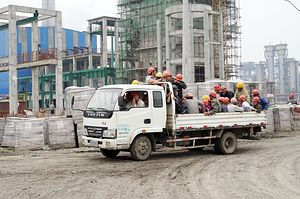Chinese Premier Li Keqiang promised that the country will allow its migrant workers to become urban residents in “an orderly way” over the next five years, according to Xinhua. In a letter he wrote to a ceremony honoring 981 migrant workers from around the country, Li said that China would improve the urban residence permit system in order to ensure the rights of migrant workers.
Under China’s hukou (or household registration) system, it’s incredibly difficult for migrant workers to officially change their place of residence to their new urban homes. As a result, many migrant workers were not allowed to access healthcare or even education for their children in the cities where they live and work.
With urbanization a key goal for the current leadership, solving the hukou problem – which acts as a de facto barrier to full urban integration for many Chinese — has been a recurring theme. In its article on Li’s comments, Xinhua called the hukou issue “a major barrier in China’s human-centered urbanization.”
Last year, China’s State Council announced that it would grant urban residence permits to 100 million permanent urban residents by 2020 – a huge number, but still less than half of the nearly 274 million migrant workers China had by 2014. That fits with the leadership’s gradual approach to reforming the registration system. Li’s remarks that the process would be “orderly” fits with the slow-and-steady tactics China has adopted so far.
The reasons for going slow are tied to the benefits that having the proper hukou confers on urban residents. Local governments risk being overwhelmed by an influx of new official residents, all of whom can claim access to the social services funded by the cities. Meanwhile, those who already have urban hukous are loath to share their privilege.
The 2012 case of Zhan Haite, a teenager who started a microblog to spread awareness of how the hukou system limits educational opportunities for migrant children, showcased this divide. On one side, those who supported Zhan argued that she should have the right to attend high school in Shanghai, where she grew up. Others, however – many of them Shanghai residents – saw Zhan and others like her as a threat to educational opportunities for their own, legally registered children. In this case, the migrants’ registered urban neighbors were some of the most outspoken opponents of hukou reform.
China’s strategy has been to go slow, to be selective, and to assure urban elites that top-tier cities will not maintain controls on migration. Based on plans from China’s State Council, the hukou reform will target only certain migrants – those whom Xi Jinping described last February as “suitable people.” These ‘desirable’ urban migrants are defined according to their employment record, education level, and housing situation. Mega-cities such as Shanghai and Beijing will have the strictest criteria while smaller cities will make it easier for migrants to receive a hukou.

































